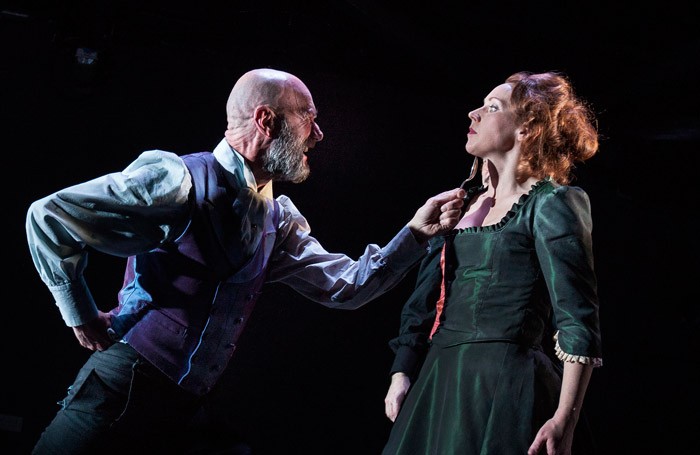@ Citizen’s Theatre, Glasgow, until Sat 7 May 2016
Candice Edmunds runs riot with Francis Poet’s precise and considered adaptation of August Strindberg’s early 20th century source, crafting an intimate and brutal experience in the confines of the Circle Studio at the Citizen’s Theatre.
Captain (Tam Dean Burn) and Alice (Lucianne McEvoy) are living on a raft, their island, and drifting further away from civilisation by the minute. On the eve of their silver wedding anniversary they are running out of supplies and embroiled in an endless cycle of hatred and abuse. To escape this torment, and to be free of this marriage, only death – or the death of a significant other – will suffice. Or will it be the visit of their old friend Kurt (Andy Clark) that finally ruptures their marriage?
Dean Burn and McEvoy perform this violent dance with an incredible amount of energy and range. At eighty minutes, this bitter exchange could have grown tiresome, yet the hurled insults feel continually new, and always painfully funny. Sitting in traverse, at ringside seats to this eternal sparring, every cruel blow is intimately felt by the audience. Dean Burn’s ageing and growling Captain is raging and savage, whilst McEvoy is by contrast quiet, yet venomous, brimming with bile and meticulously cruel. They are a fantastic couple, always well-matched, two unstoppable forces.
Edmunds has crafted a wonderfully kinetic piece. Whether it is a thunderous highland dirk danced with a dessert spoon, or the couple’s vicious and twisting orbit about the bewildered Kurt, this production is relentless in its intensity. A claustrophobic anxiety permeates through to every aspect of the design. Graham McLaren’s dilapidated set dominates the space, and the distant rumbling of Luke Sutherland’s sound design and Simon Wilkinson’s ominous lighting are the only glimpses of an ever retreating and potentially threatening outside world.
Underpinning this production is an adaptation by Poet layered with smart dramaturgical choices and a flexible relationship to its source. These cuts, revisions and imaginings might not satisfy purists but they serve to transform Strindberg’s text into something new and absolutely relevant. Poet’s use of language is always liberal, shifting into colloquialism for the best punch-lines, but never straying too far from its source by attempting to be too overtly up to date. The result is that it feels focused, distilling the text into what matters most to the audience, the corrosive yet enduring love between these two protagonists.
At its absurd yet entirely believable conclusion, their poisonous marriage has battered and seduced its audience in equal measure. Dance of Death is an exhausting encounter with a couple who, for better or worse, are most definitely in love.
